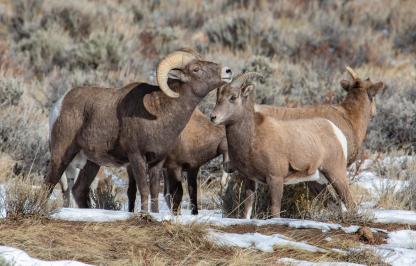Each spring, calls come in to area game wardens, wildlife biologists and the Sheridan Regional Office from well-meaning residents who have found a deer or antelope fawn or elk calf they believe is orphaned or abandoned. However, in the majority of cases, the fawn or calf is not orphaned, lost or otherwise in danger. In fact, does and cow elk intentionally leave their young offspring on their own for most of the day during their first weeks of life and this is natural and safe behavior.
Many ungulates (hooved mammals) employ the ‘hider’ strategy to improve survivability of their offspring. Employed by deer, elk and pronghorn, the strategy depends on concealment rather than defense to protect young offspring.
For example, as their calving time nears, cow elk will move away from the main herd and seek a solitary location to give birth. After the calf arrives, she will consume the placenta and surrounding soiled dirt and vegetation to reduce the scent associated with the birth.
Calves then remain hidden, quiet and mostly motionless for their first few weeks of life. They emit little smell compared to an adult, so the cow will limit her time around the calf. She will visit only occasionally to feed it, to reduce the chances of attracting a predator. Additionally, calves (and deer fawns) are born with spotted coats that very effectively camouflage the young animal as they hide in tall or thick vegetation.
It is during this period of hiding that people may come across an elk calf or a deer fawn while working or recreating outdoors. Rather than signaling a problem, a hidden, solitary calf or fawn is behaving exactly as it should. You may not see the mother nearby, but she is likely in the area coming to feed and care for the calf or fawn regularly and then moving away again. If you find a fawn or calf, do not approach, touch or move it. Doing so will decrease its chances of survival.
Bird chicks are also regularly found and reported to Game and Fish after falling from nests. Again, the mother is likely nearby and will continue to feed and care for the chick while it is on the ground.
Children are often the ones who find a chick on the ground while playing in the backyard and become concerned about its situation, sometimes picking it up to take to an adult. Now is a good time to have a conversation with them on the importance of leaving baby chicks where they are and emphasizing that the mother is still caring for the chick even though it is out of the nest. Picking up or moving the chick will stress it, the mother and lower its chances of surviving. In addition, there are some parasites and diseases that can transfer from wild birds or animals to humans.
Children will likely want to do something to help though and the most important action they can help with is keeping domestic pets from getting near the chick. If you own a dog or cat, consider keeping it indoors or leashed while outside, to prevent it from injuring or killing the chick. Chicks mature quickly and should take only a few days to build strength and fly on their own.
In the rare instance where a newborn animal is found and the mother is known to be dead, do not approach or capture the animal. Instead, contact the Sheridan Regional Office at 307-672-7418.



